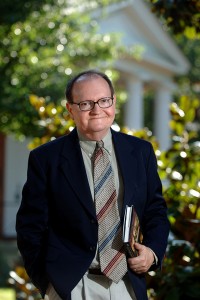OXFORD, Miss. – Charles Reagan Wilson brought together everything from Hank Aaron to zydeco as co-editor of the Encyclopedia of Southern Culture, and now his final chapter at the University of Mississippi is complete. After 33 years as a history and Southern studies professor, Wilson retired in May.
During his three decades at UM, Wilson has watched both the Center for the Study of Southern Culture and the university grow.
“I have been so fortunate to be able to think about the South and to talk to visiting scholars, researchers, lecturers, students and to think about the South from the perspective of the University of Mississippi and the state of Mississippi,” Wilson said.
Wilson made quite a name for himself during his time at UM, said Ann Abadie, associate director emeritus.
“He came to the University of Mississippi for an interview in early 1981 and, after visiting with him and hearing his lecture on religion in the South, Bill Ferris, Sue Hart and I, along with many others affiliated with the Center for the Study of Southern Culture, knew that he would be the perfect director for our encyclopedia project,” Abadie said. “Charles accepted the challenge and in the fall began working on the encyclopedia, teaching courses in history and Southern studies, and enlightening the community with talks about the religious and cultural history of the South.”
In the beginning, Wilson’s job was managing editor of the Encyclopedia of Southern Culture. The National Endowment for the Humanities gave the university a grant to fund the project.
On Jan. 26, 1983, he spoke about Robert E. Lee and other Southern heroes who at their deaths were honored with elaborate funeral processions and mourned throughout the region. Answering an audience question about the next Southern hero likely to receive such acclaim, Wilson predicted Bear Bryant. Later that day, when news broke of Bryant’s death, students and colleagues began referring to Wilson as “Dr. Death,” a moniker that has stuck.
The nationally acclaimed publication of the Encyclopedia of Southern Culture in 1989 earned him a second epithet, the “Diderot of Dixie.”
He served as director of the Southern studies academic program from 1991 to1998, and as director of the Center for the Study of Southern Culture from 1998 to 2007. As director of the center, Wilson played important roles in helping establish the Southern Foodways Alliance and the William Winter Institute for Racial Reconciliation, and continued to receive accolades as a teacher and a scholar, including the 2010 Distinguished Research and Creative Achievement Award.
Wilson’s first book, “Baptized in Blood: The Religion of the Lost Cause, 1865-1920″(University of Georgia Press, 1983), helped bring the concept of civil religion into Southern studies scholarship and was the first book to address the topic of how white Southerners came to remember the Civil War as a kind of religious effort. Historians continue to use the book to understand the meanings and memories of the Civil War.
In 1995 Wilson published a collection of closely related essays, “Judgment and Grace in Dixie: Southern Faiths from Faulkner to Elvis,” and in 2011 he published “Flashes of a Southern Spirit: Meanings of the Spirit in the U.S. South,” both with University of Georgia Press. All three works show his expertise in Southern religious history, a topic Wilson taught in numerous undergraduate and graduate classes.
Despite saying that one of the things he learned from the first encyclopedia was never to do another one, at the beginning of the 2000s, Wilson and colleagues at the center and the University of North Carolina Press decided a “New Encyclopedia” should be published, with 24 volumes.
“It was a bit daunting when we first started, but looking back on it, that was a great decision, enabling us to expand the scope of that encyclopedia, update everything and add new articles, and really make it an encyclopedia for the 21st century, raising a lot of the issues that have come out of the explosion of scholarship in Southern studies in the last 15 years or so,” Wilson said.
Wilson has an extraordinary record as an adviser of graduate work. He has directed more than 20 dissertations in history and more than 100 master’s theses in Southern studies and history, and he has served on, as described by center director Ted Ownby, “too many thesis committees to count.”
“The encyclopedia work Charles has done really contributes to his teaching, because it means he is interested in everything,” Ownby said. “Charles has a great talent for listening to what students say about their interests and then finding the best ways to help them turn those interests into scholarly projects.”
Wilson was also interested in how religion related to the issues of race, gender, social class and the diversity of social places beyond the stereotypes of the South.
“History became a way for me to think about and research particular topics that would help to illuminate the complexity of the South,” Wilson said.
In retirement, Wilson will focus on two writing projects.
“After retirement this spring, he will complete his books on the Southern way of living, the Southern way of dying and other topics, and have time to enjoy other names he has earned, including Distinguished Professor, Witty Raconteur, Gourmet Cook, Charming Host, Superb Guest and Dear Friend. I wish him well,” Abadie said.
Besides researching and writing “The Southern Way of Life” and a short cultural history of the South, Wilson will be traveling more, spending time in his garden and experimenting more in the kitchen.
